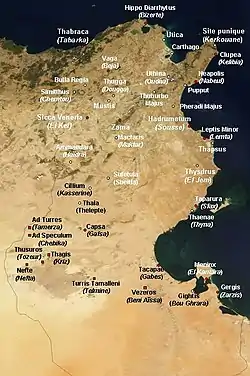
Turris Tamalleni was a town in North Africa,[1] dating from the Carthageinian, Roman, Byzantine and Vandal era.[2][3]
Geography
The town was west of Tacapes and South of Capsa.[4][5][6] It is located on the oasis of Mansura, 1.5 kilometers from Telmine and 7.5 kilometers from Kebili.
History
Turris Tamalleni town was founded before Carthage, when the Nybgenii Tribe established a fortified granary and a fortified residence for the tribal head.[7] It was renamed in the 1st century C. Civitas Nybgenorium, and remained the center of the Nybgenii Tribe[8] and the name Turres being probably the indigenous name.[9] It was originally a fort on the Roman Limes,[10] and linked by Roman Road under Domitian.[11] Later it became a municipium under Hadrian(about 105AD) taking the name Turris Tamalleni.[12] It is mentioned in the Antonine Itinerary on the road on the borders of Tripoli and Leptis Magna.[13] During the latter Roman era it was a Bishop's seat and a center of resistance of the Almoravids. The city was taken and destroyed by the Almohads in 1205AD.[14] An Arab town called Torrah or telmin was built from the rubble of the Roman town and is identified as runs at ruins of Oum-Es-Samâa. Today, nothing remains of the ancient city. All that remains of the ancient town is two large irrigation basins separated by a wall, which were restored in 1780 by the Bey of Tunis, they form a lake of one hectare.[15]
Bishopric
The Bishopric founded in the fourth century ceased to function with the arrival of the Arab forces, but remains a titular see of the Roman Catholic Church.[16] The current titular bishop is Linus Lee Seong-hyo, auxiliary bishop of Suwon.
Bishops
- Gaudenzio assisted the Carthaginian council called by Grato in 349.
- At the Carthage conference of 411, which saw the Catholic and Donatist bishops of Roman Africa gathered together, the Catholic Sabratius and the Donatist Jurata represented the city.
- Habetdeum intervened at the synod gathered in Carthage by Huneric the Vandal king in 484, after which Habetdeum was exiled.
- Pentasio attended the antimonotelite council of 641.
- Thomas Keogh (25 Sep 1967 Appointed - 22 May 1969)
- Francis John Dunn (1 Jun 1969 Appointed - 17 Nov 1989)
- Alphonse Liguori Chaupa (24 Jun 2000 Appointed - 4 Jul 2003)
- Paul Ponen Kubi, (24 Dec 2003 Appointed - 15 Jul 2006)
- Damián Santiago Bitar (4 Oct 2008 Appointed - 26 Oct 2010 )
- Linus Lee Seong-hyo (7 Feb 2011 Appointed - )
References
- ↑ Guide Bleu. Tunisie, éd. Hachette, Paris, 1974, p. 237
- ↑ The Roman Background of Tripolitania.
- ↑ Jean Baptiste Bourguignon d' Anville, John Horsley , Compendium of Ancient Geography, Volume 2 (R. Faulder, 1791) p 829.
- ↑ James S. Reid, The Municipalities of the Roman Empire (Cambridge University Press,2014) p292.
- ↑ Impact of Empire (Organization). Workshop, Frontiers in the Roman World: Proceedings of the Ninth Workshop of the International Network Impact of Empire (Durham, 16–19 April 2009) (BRILL, 2011) p107.
- ↑ Digital Atlas of the Roman Empire.
- ↑ Guide Bleu. Tunisie, éd. Hachette, Paris, 1974, p. 237.
- ↑ David J. Mattingly, Tripolitania (Routledge,2003) p 67.
- ↑ David J. Mattingly, Tripolitania (Routledge,2003) p214.
- ↑ Louis Harmand, L’Occident romain, Gaule, Espagne, Bretagne, Afrique du Nord, éd. Payot, Paris, rééd. 1970, chapitre XI (Constitution des limes africains), p 269.
- ↑ David J. Mattingly, Tripolitania (Routledge,2003) p
- ↑ Mary Taliaferro Boatwright, Hadrian and the Cities of the Roman Empire, Princeton University Press, 2002, p 39.
- ↑ Louis Harmand, L’Occident romain, Gaule, Espagne, Bretagne, Afrique du Nord, éd. Payot, Paris, rééd. 1970, chapitre XI (Constitution des limes africains), pp287.
- ↑ TURRIS TAMALLENI .
- ↑ Guide Bleu. Tunisie, éd. Hachette, Paris, 1974, p. 237.
- ↑ Turris Tamalleni at GCatholic.org.